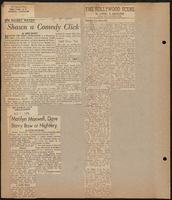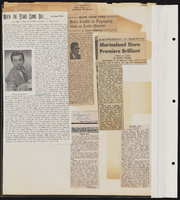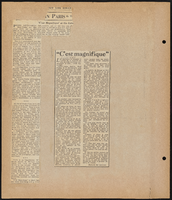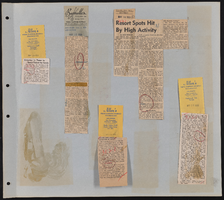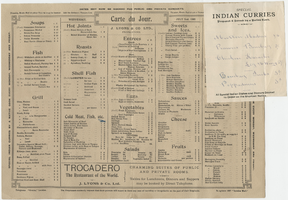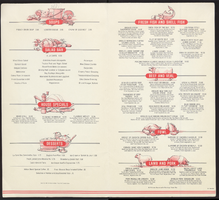Search the Special Collections and Archives Portal
Search Results
Michelle Merced (Neighborhood Housing Services of Nevada) oral history interview conducted by Kelliann Beavers: transcript
Date
Archival Collection
Description
From the Lincy Institute "Perspectives from the COVID-19 Pandemic" Oral History Project (MS-01178) -- Community organization interviews file.
Text

Transcript of interview with Judy Jetter by Lisa Gioia-Acres, September 10, 2008
Date
Archival Collection
Description
Judy Jetter, a devout jazz music enthusiast, was born in a Chicago suburb in 1939. At the age of three, Judy began taking acting as well as tap and ballet classes. While raised by her mother until age 15 Judy was forced to study opera even though jazz music was her passion. Her first introduction to jazz came while listening to, legendary jazz great, Woody Herman on the radio. Judy developed an instant appreciation and love for jazz music. While working as a commercial actress during her childhood - Super Circus and Peter Pan peanut butter - Judy experienced live performances by the Stan Kenton Orchestra and was completely amazed. After graduation Judy was married and gave birth to her son. She worked for a movie studio in Chicago doing various jobs such as cleaning the stage, typing scripts, model work, and even playing the role of housewife. Later Judy went to college and earned a degree in psychology, which led to a job as a therapist. However, after remarrying to Bill Jetter, Judy switched careers and soon became an exercise instructor at the YMCA. There she cultivated her passion for working with people who suffered from disabilities. In particular, Judy developed a water regiment specifically designed for people with disabilities. Judy would go on to share her experiences in this field in two subsequent book publications. Unfortunately Judy's husband passed away with cancer. However, Judy found refuge and support from a group of jazz enthusiasts. Alongside her cadre, Judy began really studying how to listen to music. She moved to Las Vegas in 1992 and can often be found at different jazz venues throughout the city. She enjoys the local jazz scene in Las Vegas and making her weekly rounds to take-in Big Band and jazz singers such as Jobell and Terri James, as well as going to see Bruce Harper playing at Bugsy's, and the talented Gus Mancuso performing at the Bootlegger. Judy believes that music, like everything else, has evolved and will continue to mature; however, jazz musicians such as Louis Armstrong still remain as the foremost contributors in the long history of jazz music. Her hope is that music and the arts will continue to be offered through education to allow the next generation another "dimension to not only their education but their soul."
Text
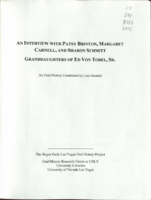
Transcript of interview with Patsy Brinton, Margaret Carnell, and Sharon Schmitt by Lois Goodall, April 30, 2014
Date
Archival Collection
Description
In 1905 a twenty-two-year-old second-generation Swiss American left Los Angeles with a friend for Lincoln County, Nevada. Edward "Ed" Von Tobel (1873-1967) and his friend Jake Beckley had heard about some land that was going up for auction. Together they purchased a parcel on the second day in the new desert town of Las Vegas, where they established Von Tobel's Lumber Company, which served Southern Nevada from 1905 until it closed in 1976. In Las Vegas Von Tobel met and married fellow German-speaker Mary Hameril, and together the couple raised four children in the city: Jake, Katherine Elizabeth, Ed Jr., and George. Many Von Tobel descendants live here still. Margaret Carnell, granddaughter of Ed Von Tobel and Mary Hameril and the oldest of three daughters of Elizabeth Von Tobel and Kenneth Zahn, was born in Las Vegas in 1939. After attending Arizona State University Margaret married in Phoenix, Arizona, in 1958 Margaret raised two children in Scottsdale, Arizona, before returning to Las Vegas in 1983. Margaret manages the Von Tobel family properties and in her spare time likes to travel. Patricia "Patsy" Brinton is the second daughter of Elizabeth Von Tobel and Kenneth Zahn. Like her sisters Patsy was raised in Las Vegas, where in 1972 she married real estate broker Robert Brinton. The Brintons raised two daughters and a son. Like her cousin Sharon, Patsy donates considerable volunteer hours through Assistance League of Las Vegas and Junior League of Las Vegas. Patsy enjoys traveling and playing golf and tennis. Sharon Schmitt, the second of four daughters of Edward Von Tobel Jr. and Evelyne Leonard, was born in Las Vegas in 1940. In 1963 in Las Vegas Sharon married Larry Schmitt, an agent for Allstate Insurance. Besides enjoying traveling and playing tennis, Sharon has long been an active community volunteer through Assistance League of Las Vegas, Junior League of Las Vegas, and Saint Elizabeth Ann Seton Catholic Church. Together the Schmitts raised a family of three children, who still live in Las Vegas and are raising the next generation of the Von Tobel family.
Text
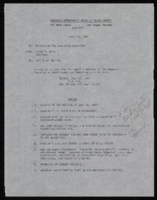
Economic Opportunity Board of Clark County (Nev.): memos, agendas, and meeting minutes
Date
Archival Collection
Description
From the Clark County Economic Opportunity Board Records -- Series I. Administrative. This folder contains memos, agendas and minutes from meetings of the Clark County Economic Opportunity Board from July 1967 through December 1967.
Text

